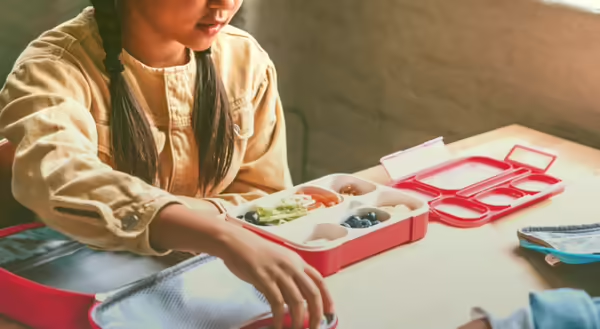
When packing a lunch for school, work or an outing, you may think about nutrition, so you pack an apple and baby carrots. You may also think about food safety, so you throw in an ice pack or two. But do you ever think about packing a waste-free lunch? Each person creates an average of 4.5 pounds of garbage per day, which negatively impacts our environment. Nonbiodegradable plastic packaging pollutes our oceans and affects wildlife, and trash dumped in landfills releases powerful methane gas, linked to climate change. Packing a waste-free lunch is a good start to being an environmental steward.
You have likely learned long ago to reduce, reuse and recycle. With the three R’s on our mind, we can pack a healthy, safe, and waste-free meal. Reduce by using less packaging. Rather than buying individually wrapped items, buy in bulk and portion out what you want in a reusable container. It’s not only more environmentally friendly, it’s also budget friendly. A zero-waste lunch also means zero food going into the trash. Don’t pack more than you think you or your child will eat.
Reuse with refillable thermoses, containers, and water bottles rather than packing juice cartons, soda cans and food in plastic baggies. Place items in a clean insulated cooler bag instead of a paper or plastic bag. Pack metal utensils that can be washed and reused, but don’t be tempted to reuse plastic utensils, cups or plates. When exposed to hot water and detergent, the plastic can start to degrade, leaching chemicals into the food. If you must use plastic, be sure to recycle it. Plastic bottles, aluminum cans, glass bottles and paper bags should also be thrown into the recycle, not the garbage. Recycling just one soda can, saves enough energy to power a TV for three hours. Bring home food scraps to compost and feed your garden or check with your school or place of work to see if they have a composting option. In a time of New Years resolutions, consider the goal of packing waste-free lunches. You’ll save money and protect this beautiful planet we live on!
Sources:
University of Wisconsin Madison. Curiosities: Is it safe to reuse plastic knives and forks? https://bit.ly/dontreuseplasticutensils
Pack a waste free lunch. Poster. USDA. https://bit.ly/usdaposter
ABOUT THE AUTHOR: Jenna Smith is a Nutrition and Wellness Educator with University of Illinois Extension, serving Livingston, McLean, and Woodford Counties. Smith uses her experience as a registered dietitian nutritionist to deliver impactful information and cutting-edge programs to Livingston, McLean, and Woodford Counties and beyond.